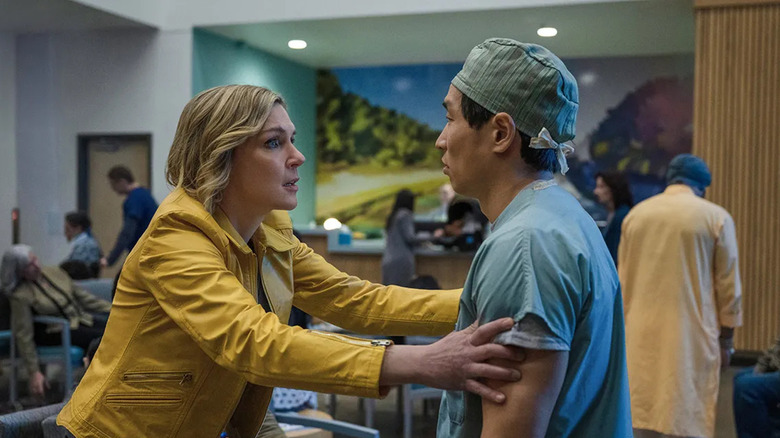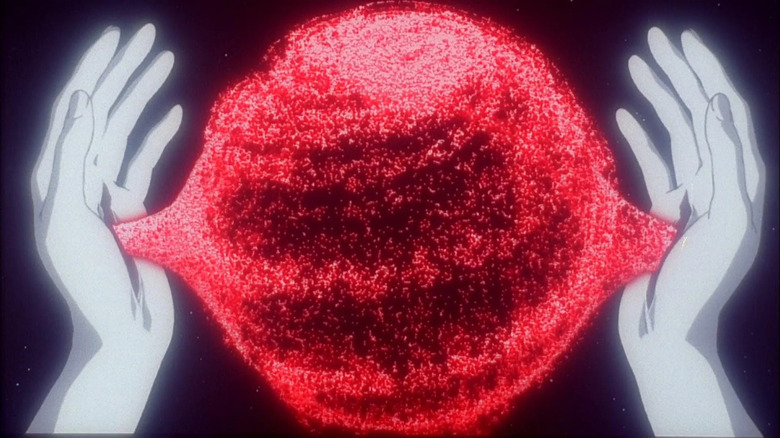Apple TV's Pluribus Episode 1 Twist Is Straight Out Of A Legendary Anime
The following post contains heavy spoilers for the first two episodes of "Pluribus."
Vince Gilligan is one of our best and most successful TV auteurs, a man who helped revolutionize the medium of television several times, from his time as a writer on "The X-Files," to "Breaking Bad" helping kickstart the Prestige TV era with its impeccable character work. But after spending nearly 15 years telling stories of corruption and redemption, grounded character drama, and the criminal underworld, Gilligan is going back to his roots in his latest, "Pluribus." That's because this AppleTV drama is actually a sci-fi show.
In "Pluribus," Carol Sturka (played by "Better Call Saul" breakout Rhea Seehorn) is a famous author of a rather successful series of pirate romance novels. She's adored by fans, has fame and money, and a woman who loves her, and yet she is deeply unhappy with her life — at least with her life's work, which she sees as disposable literature. In her mind, she's selling out to the masses rather than actually writing something of value.
But then something changes, and Carol becomes the only unhappy person on Earth, surrounded by happy, docile people who talk in unison and act like they are all the same person. That's because "Pluribus" takes place in a world taken over by an alien virus that has turned all of humanity into a single entity, a single shared consciousness.
This is reminiscent of a classic sci-fi tale where all of humanity is melted into a single mind that takes over the world like a hive mind. No, not that one, a classic anime — "Neon Genesis Evangelion." That's right, Vince Gilligan is giving us Human Instrumentality.
The plot of Pluribus is reminiscent of Neon Genesis Evangelion's Human Instrumentality
In "Neon Genesis Evangelion," the shadowy organization known as SEELE spends decades working toward a singular goal — to bring about the apocalyptic event known as the Third Impact and force the evolution of humanity by bringing together all human souls, uniting them as one being. This would create a transcendental existence where no one exists singularly, where everyone's flaws would be complemented by others' strengths, thereby erasing our insecurity and shame.
In reality this looks like the end of days, with all human bodies dissolving into an orange liquid, their minds melting but their bodies dying. This is much like how the assimilation process in "Pluribus" that blended all consciousness together still killed millions upon millions of people in an apocalyptic scenario. The result, however, does look rather pleasant, with crime, poverty, hunger all being eradicated, together with sadness and loneliness.
Except "Evangelion," like "Pluribus" is doing now, showed us this is a fallacy. Though theoretically every human now complements one another, Shinji realizes living under Human Instrumentality is simply an empty existence — that without the difficulties of life, there's no meaning to being alive. Becoming one with others is not the same as actually knowing or being with others.
Rhea Seehorn's Carol may think she's just fighting to save humanity from an alien invasion, but there's more, she's fighting for the fundamental right to be human. Her refusal to conform to the new normal, to embrace the hive mind and become happy, her decision to remain grumpy is to delight in the complexity of human existence. Life can suck, it is full of pain — she literally just lost the woman she loved in her world's version of Human Instrumentality — but that pain gives life meaning, and it's worth fighting for.

